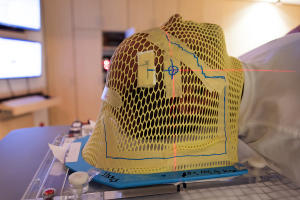by
John R. Fischer, Senior Reporter | October 27, 2021

Changing cancer care delivery may help black patients complete radiation therapy more
Adjusting coordination of cancer care may help reduce issues that prevent Black patients from finishing radiation therapy. That’s what researchers from North Carolina said this week at the American Society for Radiation Oncology annual meeting in Chicago.
Historically, the Black community has experienced higher death and shorter survival rates due to cancer than any other racial/ethnic group. Obstacles such as limited transport access and the inability to take off work, have prevented them from completing treatment, according to the American Cancer Society.
In their study, the researchers implemented Accountability for Cancer Care through Undoing Racism and Equity (ACCURE), which comes from a clinical trial that is the first prospective study designed to stop interruptions to the completion of treatment and eliminate racial disparities in the survival gap. The ACCURE trial previously showed progress in reducing disparities in radiation therapy and surgery for early-stage breast or lung cancer patients. The researchers assessed whether by increasing completion rates, it also helped improve outcomes, especially in reducing racial survival disparities.



Ad Statistics
Times Displayed: 60654
Times Visited: 1936 Ampronix, a Top Master Distributor for Sony Medical, provides Sales, Service & Exchanges for Sony Surgical Displays, Printers, & More. Rely on Us for Expert Support Tailored to Your Needs. Email info@ampronix.com or Call 949-273-8000 for Premier Pricing.
“Unless we ask what happens when an appointment or milestone is missed, we just don't know what's going on, and the patient may never come back to us. If we do ask, we often have systems in place that can address those barriers. We can provide transportation or provide a letter for the patient for work. We can overcome many barriers, both internal and external to our healthcare institutions, but only if we know what they are,” said lead author Dr. Matthew Manning, a radiation oncologist and chief of oncology at Cone Health, in a statement.
Comparing five-year survival for 1,413 patients with stages 0, I and II lung and breast cancer treated after the intervention to those of 2,016 treated before, they found survival for both Black and white patients rose from 89% and 91%, respectively, to 94% for both after system-level changes. Black patients treated for early-stage lung cancer saw survival go up from 37% to 54%, while whites saw it rise from 43% to 56%.
Among the changes made were the installation of an EHR with automatic alerts to flag missed appointments or unmet milestones in expected care; a nurse navigator trained in race-specific barriers to help patients overcome obstacles to care when alerts were made; a physician champion to provide race-related feedback to healthcare teams about the completion of treatment; and regular health equity education training sessions for staff.


Al Lawson
Addressing disparities in cancer care treatments
November 01, 2021 10:45
Many thanks to the researchers for their clear documentation of patient needs that must be addressed. I would strongly urge that this is also a clarion call to more broadly integrate Oncology Social Work into clinic workflows. Oncology social work represents a caring, cost effective advocate for identifying and understanding patient and caregiver needs regardless of the treatment modality.
to rate and post a comment